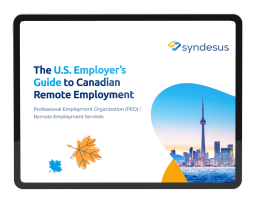It’s finally happening! You’ve landed a job in Canada and all your immigration paperwork is in order — but are you really ready to move?
Whether you’ve found your own pathway into Canada or are considering your options, you want to be proactive in preparing for the big move.
For those who are still seeking immigration pathways in Canada, Global Talent Stream (GTS) is just one exceptional option that makes it easy for Canadian employers to hire foreign workers.
In just a few weeks you can get authorization to work in Canada through GTS, and the program is an excellent pathway to permanent immigration to Canada. Plus, you only need one year of Canadian work experience to qualify for permanent residency.
But even when you’ve crossed the big, important items off your to-do list, like securing the job and applying for and getting your visa, you don’t want to forget the “little” things that will be crucial for you to set your life up in Canada, like health care, banking, housing and more.
These logistics can be complicated and leave you feeling overwhelmed, especially when planning your relocation to Canada, and not every immigration service provider can help you or connect you with someone who can help you get settled in Canada.
Here are the 6 most important things you need to do to get settled in Canada after a relocation
Banking
The cost of living in Canada’s major cities is typically lower than in the US. While the United States is much larger than its northern neighbor in terms of GDP, the average income per capita is similar in both places.
You’re not legally required to have a Canadian bank account to work in Canada, but having a place to safely save your money is smart, and it’ll make processing paychecks and eventually paying taxes much easier.
For a limited period of time, banking is free for newcomers to Canada…
Even foreigners can open bank accounts in Canada if they have the proper identification. The specific requirements vary from bank to bank, but generally, you’ll be asked to show:
- Valid passport
- Immigration papers, such as Temporary Residence Permit or a work permit.
- Social Insurance Number
- Proof of address
For a limited period of time, banking is free for newcomers to Canada, but once that free period expires, you can expect to pay monthly fees to the bank. Some banks will waive these fees if you keep a minimum — usually around CAD$3,500 — in your bank account.
In terms of choosing a bank in Canada, there are the Big Five Banks in Canada to choose from:
Royal Bank of Canada, The Bank of Montreal, Canadian Imperial Bank of Commerce, The Bank of Nova Scotia, and Toronto-Dominion Bank.
Housing
Just like in the US, Canada housing prices have been setting records over the past couple of years.
Of course, some cities and provinces in Canada are more expensive than others. The two most expensive cities in Canada are Toronto and Vancouver.
The national average home price was a record $748,450 in January 2022, up 21% from $618,587 a year earlier. Interestingly, real estate brokers and economists believe part of the real estate boom is thanks to newcomers entering the country after immigration ground to a halt during the pandemic.
To rent a one-bedroom in Vancouver will cost you $2,176/month, which is up 13.2% from last year. And a one-bedroom apartment in Toronto will cost you $2,013/month, which is up 9.2% from last year.
If you’re interested in buying a home in Canada, prepare to pay over $700,000. Mortgage rates have also been on the rise in Canada, with the average uninsured rate closer to the 3% mark.
However, if you choose to live just outside of most city centers in Canada, you can save thousands of dollars.
If you have the flexibility to work remotely, consider picking a location that suits your lifestyle. Canada has an abundance of rural communities that can get you close to great Canadian outdoors like the Rocky Mountains.
Medical coverage
Considering that medical bills are the largest source of debt for Americans, it’s important to point out the benefits of Canada’s universal healthcare system.
The system is funded through taxes and Canadian citizens or permanent residents don’t have to pay for most healthcare services.
In fact, 18% of Americans have medical debt and collection agencies held $140 billion in unpaid medical bills last year!
Unlike its US counterpart, Canada’s medical coverage can provide some relief on your wallet. The system is funded through taxes and Canadian citizens or permanent residents don’t have to pay for most healthcare services.
Canadians pay an annual average of $7,068 in taxes for healthcare, compared to approximately $10,739 that the average American can expect to spend annually on their health.
Canadian universal health care is available for:
- Canadian citizens
- Canadian permanent residents
- Eligible refugees and refugee claimants
- Eligible protected persons, under the Interim Federal Health program
If you don’t fall into one of these categories, you’ll most likely need to buy private health insurance.
The average Canadian household spends $2,000 on health care costs and $4,000 on private insurance premiums. There is a good chance that your Canadian employer will offer a group plan and the monthly fees will come directly from your paycheck.
Education
If you’re bringing a young family to Canada, you’re probably wondering about schools for your kids.
Because the public education system in Canada is a top priority for the government, it’s well-funded and arguably among the world’s best. Not only that, it’s welcoming too — migrant parents should note that Canada’s school student population includes a high number of migrants.
Indeed, more than a third of young people in Canada come from families where BOTH parents were born in another country. Because multiculturalism is the norm in Canadian schools, newly arrived children tend to integrate into their new schools quickly and usually perform at the same level as their classmates.
In addition to solid public elementary and secondary school, public universities and colleges in Canada are mostly funded by provincial governments, and students are usually charged minimal tuition fees.
Tuition at top Canadian Universities is 16-38% cheaper than at the best schools in the US.
In the US, undergraduate tuition, fees, room, and board were estimated to be $17,797 at public institutions and $46,014 at private nonprofit institutions. In comparison, Canada’s typical average annual tuition at a public college in 2021 was $7,938 Canadian dollars or $6113.61 US dollars.
Driving
To legally drive a car in Canada, you’ll need a government-issued driver’s license. The driver’s license you were issued in your home country will probably work in Canada for a short period of time, but you’ll eventually need to get a Canadian license.
If you are from a country that signed the 1949 Convention on Road Traffic, you may be able to simply exchange your foreign license for a driving license in Canada.
Before you arrive in Canada, apply for an International Driving Permit (IDP) in your home country.
Otherwise, you may need to sit for a knowledge test and take a driving test to get your Canadian license. In addition to a license, you’ll also need proof of car insurance.
Mobile phones
Mobile phones have found a permanent place in our day-to-day lives. But, unfortunately, Canadians pay some of the highest wireless prices in the world.
In 2019, Canadians were paying $57 to $101 per month for phone plans that included 5GB of data. This is two or three times the average rate for most European plans!
In March 2020, the Canadian government mandated that mobile carriers reduce their prices by 25% by 2022. As a result, three of Canada’s popular phone providers — Fido, Koodo, and Virgin — all offer plans that start at $45 per month for 6GB of data.
Syndesus can help you get started in Canada
Syndesus can help you relocate to Canada and continue to work for your American employer. And if your US employer doesn’t have a Canadian office, no problem.
As a professional employer organization (PEO), Syndesus can legally hire you on behalf of your US employer. We take care of the billing, HR, legal and other paperwork, and you come to work, in Canada, just the same!
And if you’re looking for a new tech job in Canada, Path to Canada, a service provided by Syndesus, can match you with Canadian tech jobs that are open to sponsoring and hiring non-Canadians.
Whether you’re moving to Canada with your current US job through our PEO services, or if you’ve found an entirely new job with a Canadian company via our Path to Canada services.
…we only work with quality employers, whether in the US or Canada, that are dedicated to finding, hiring, and retaining the best people in Canada...
Whatever your path, Syndesus helps you check all the important boxes: banking, housing, health care, the school system, driving, and even your cell phone.
There are companies out there that charge you for these services, but we don’t do that.
Instead, we only work with quality employers, whether in the US or Canada, that are dedicated to finding, hiring, and retaining the best people in Canada, which means they support you in the entire relocation process, including paying for your work visa and guiding you to get settled in. And it’s our job to make that journey happen as smoothly as possible.
We can help you open a bank account, rent an apartment, and find the perfect school for your kid. But we can also help you get to Canada in the first place.
Reach out to us to learn more about how we can help you work remotely for a US tech company from Canada, or join our Path to Canada database of qualified candidates seeking to move to Canada and get matched with a Canadian tech employer.




